Index relies entirely on the support of donors and readers to do its work.
Help us keep amplifying censored voices today.
[vc_row][vc_column][vc_video link=”https://youtu.be/d-q_4RcHH_0″][vc_column_text]The National Gay and Lesbian Human Rights Commission (NGLHRC ) is the only organisation in Kenya — where homosexuality is still a criminal offence and attacks on the gay community frequent — using a legal route to challenge LGBTIQ discrimination.
Men who have sex with men in Kenya can be punished by up to 14 years in prison and, although there are no specific laws relating to women, Prime Minister Raila Odinga said in 2010 that women who have sex with women should also be imprisoned. LGBTIQ people also often find themselves subject to violence and blackmail.
NGLHRC was set up in 2012 by six young legal advocates, but its name was officially only recognised two years ago after a long court battle, which is still being appealed. Winning the right even to exist was, according to the International Service for Human Rights, a milestone for all charities campaigning for gay rights on the African continent.
The aim of the commission is to prevent discrimination on account of real or presumed sexual orientation and gender identity, and respond to discrimination when it happens.
The way they address this is by offering legal aid to Kenya’s LGBTIQ community across every city, town, rural area, and county whenever they are faced with discrimination, harassment and violence because of their sexual orientation or gender. They also offer training to public officials and judges.
The main challenge the NGLHRC faces is difficulties in reforming the laws and policies because of delays in court dates. The insensitive messages published by the media about LGBTIQ people is also, they argue, retrograde and increases stigma and violence.
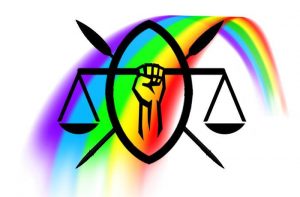 NGLHRC currently has three cases in court. Its aim is to achieve change by using litigation to ensure legal precedent. The first court case the commission is involved in is about ensuring its very survival: making sure the attorney general does not win a constitutional appeal against the registration of the commission.
NGLHRC currently has three cases in court. Its aim is to achieve change by using litigation to ensure legal precedent. The first court case the commission is involved in is about ensuring its very survival: making sure the attorney general does not win a constitutional appeal against the registration of the commission.
The second is to ensure the end of forced anal examinations which is common when a man is accused of having sex with another man.
And the third is to challenge the constitutionality of the penal code which criminalises homosexuality.
One of the biggest campaigning successes of the NGLHRC in the last year was when in September 2017. It won agreement from the Kenya Medical Association to stop forced anal examination of clients “even in the guise of discovering crimes.”
“Being nominated for an 2018 Freedom of Expression Award was quite unexpected,” said NGLHRC. “To be included with likes of so many activists, artists and organisations who are dedicated to the realisation of life-changing work is quite the honour. Many times in the quiet of each of our corners, doing the day to day work needed to make our communities better places, the work can feel isolated. Recognition of this kind reinforces that what the National Gay and Lesbian Human Rights Commission does matter.”
See the full shortlist for Index on Censorship’s Freedom of Expression Awards 2018 here.[/vc_column_text][/vc_column][/vc_row][vc_row full_width=”stretch_row_content” equal_height=”yes” el_class=”text_white” css=”.vc_custom_1490258749071{background-color: #cb3000 !important;}”][vc_column width=”1/2″][vc_custom_heading text=”Support the Index Fellowship.” font_container=”tag:p|font_size:28|text_align:center” use_theme_fonts=”yes” link=”url:https%3A%2F%2Fwww.indexoncensorship.org%2Fsupport-the-freedom-of-expression-awards%2F|||”][vc_column_text]
By donating to the Freedom of Expression Awards you help us support
individuals and groups at the forefront of tackling censorship.
[/vc_column_text][/vc_column][vc_column width=”1/2″ css=”.vc_custom_1521479845471{background-image: url(https://www.indexoncensorship.org/wp-content/uploads/2017/05/2017-awards-fellows-1460×490-2_revised.jpg?id=90090) !important;background-position: center !important;background-repeat: no-repeat !important;background-size: cover !important;}”][/vc_column][/vc_row][vc_row][vc_column][vc_basic_grid post_type=”post” max_items=”4″ element_width=”6″ grid_id=”vc_gid:1522067231973-3405d213-874a-10″ taxonomies=”10735″][/vc_column][/vc_row]
“Yassin Juma is an extraordinary journalist, who has taken great personal risks to get the story of what is happening in the war that is being waged in Somalia against Al-Shabaab,” writer Ismail Einashe told Index on Censorship.
But Juma is now in hiding.
Einashe interviewed the Kenyan investigative journalist for the latest issue of Index on Censorship magazine, which is themed on the risks of reporting worldwide.
Juma was arrested in January for posting information on social media about a recent attack on the Kenyan Defence Force by the Al-Shabaab militant group. Juma revealed that, according to a credible source within the KDF, 103 soldiers had been killed in an attack on the Kenyan army base in El Adde, Somalia.
The journalist was later arrested and faced charges of “misuse of a telecommunication gadget”. After being grilled by police and detained for two days, he was released without charge but has since gone into hiding, fearing that his reporting is angering the authorities.
Listen to Einashe explaining the significance of this case on the Soundcloud above. The full article, written by Einashe, is in the latest issue of Index on Censorship magazine.
Print copies of the magazine are available here, or you can take out a digital subscription via Exact Editions. Copies are also available at the BFI, the Serpentine Gallery, MagCulture, (London), News from Nowhere (Liverpool), Home (Manchester) and on Amazon. Each magazine sale helps Index on Censorship continue its fight for free expression worldwide.
Index on Censorship recently appointed a new youth advisory board who attend monthly online meetings to discuss current freedom of expression issues and complete related tasks. As their first assignments they were asked to provide a short bio to introduce themselves, along with a photograph of them holding a quotation highlighting what free expression means to them.
Simon Engelkes 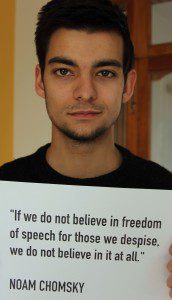
I am from Berlin, Germany, where I study political science at Free University Berlin. I have worked as an intern with Reporters Without Borders and RTL Television, which made me passionate about the importance of freedom of speech.
I believe that freedom of expression forms an important cornerstone of any effective democracy. Journalists and bloggers must live without fear and without interference from state or economic interests. Unfortunately, this is not the case. Journalists, authors and everyday citizens are imprisoned or killed by radicals, state agencies or drug cartels. Raif Badawi, James Foley, Khadija Ismayilova, Avijit Roy – the list is endless.
We need to remind ourselves and the powerful of today, that freedom of expression as well as freedom of information are basic human rights, which we have to defend at all costs.
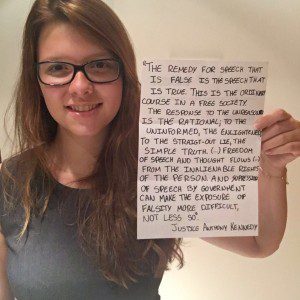 Mariana Cunha e Melo
Mariana Cunha e Melo
I am from Rio de Janeiro, Brazil. I graduated from law school in Rio and I have a degree from New York University School of Law. My family has taught me about the dangers of censorship and dictatorship, so I have always been interested in studying civil rights. This was the main reason I decided to study law.
I grew up listening to stories about the media censorship in Brazil during the military dictatorship. The fight against the ghost of state censorship has always sounded very natural to me – and, I believe, to all my generation. When I finished law school I found out that the new villain my generation has to face is the censorship based on constitutional values. The argument has changed, but the censorship is not all that different. So I decided to dedicate my academic and my professional life as a lawyer to fight all sorts of institutionalised censorship in Brazil.
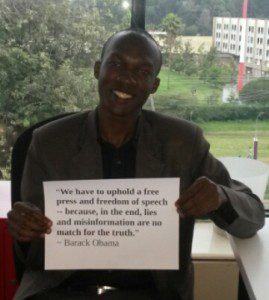 Ephraim Kenyanito
Ephraim Kenyanito
I was born and raised in Kenya, and I am currently working as the sub-Saharan Africa policy analyst at Access Now, an international organisation that defends and extends the digital rights of users at risk around the world. My role involves working on the connection between internet policy and human rights in African Union member countries. I am an affiliate at the Internet Policy Observatory (IPO) at the Center for Global Communication Studies, University of Pennsylvania. I also currently serve as a member of the UN Secretary General’s Multi-stakeholder Advisory Group on internet governance.
The reason why I have always been passionate about protecting the open internet is that it is a cornerstone for advancing free speech in the post-millennium era and there is a great need to build common ground around a public interest-oriented approach to internet governance.
Emily Wright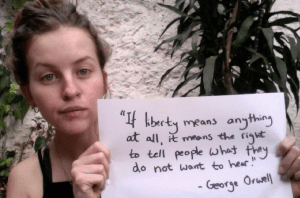
I grew up in Portugal, and I am now based between London and Bogotá, Colombia. I am a freelance filmmaker and journalist. Working in documentary production and community-based, participatory journalism informed a growing interest in journalistic practices, freedom of expression and access to information.
I believe that one of the greatest threats to freedom of expression is the flagrant violation of civil liberties under the banner of national security. The war on terror, underscored by Bush’s declaration “You’re either for us or against us”, has collapsed the middle ground, suppressing any struggles that challenge that statement. Freedom of expression has become a pretext for silencing those who have the least access to it; those who do not fall in line with the global order’s supposed defence of freedom against barbarism and obscurantism.
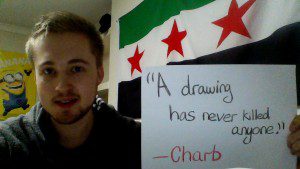 Mark Crawford
Mark Crawford
I’m originally from Birmingham, and now a postgraduate student at University College London, specialising in Russian and post-Soviet politics. This has inevitably educated me on the pressures exerted upon freedom of expression in Russia, whose suffocated and disenfranchised opposition journalists I am currently investigating.
Hostility to free expression has become a staple of my university life. Rather than developing a coherent set of ideologies to challenge toxic values in the open, it has become mainstream for students of the most privileged universities in the world to veto them on behalf of everyone else, no-platforming and deriding free speech.
I am convinced that there is no point fighting for an egalitarian society if any monopolies over truth are permitted. Freedom of speech is, therefore, something I am keen to promote in whatever small way I can.
Madeleine Stone 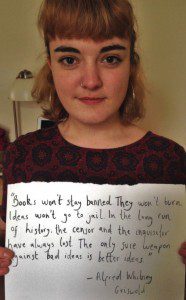
My home is in south-east London but I spend most of my time in York, studying for my bachelor’s degree in English and related literature. I am currently the co-chair of York PEN, the University of York’s branch of English PEN, and a founding member of the Antione Collective, a human rights-focused theatre company.
Studying literature from across the globe has introduced me to issues of freedom and censorship, and the devastating effects censorship can have on national progress. Freedom of expression on campuses is hugely important to me as a student and it is currently under threat. Well-meaning individuals are shutting down the open debate that is vital to academic institutions. The only way to fight harmful ideas is to engage them head-on and destroy them through academic debate, not to ban them.
Layli Foroudi 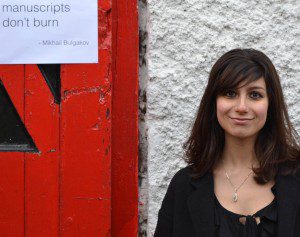
I am a journalist and student currently studying for a MPhil in race, ethnicity and conflict at Trinity College Dublin. It was studying literary works from the Soviet period during my undergraduate degree in Russian and French at University College London that initially highlighted the issue of censorship for me. The quote I selected, “manuscripts don’t burn”, is from the book Master and Margarita by Russian author Mikhail Bulgakov. He wrote about the hardship that many writers faced as they had to adjust their own writing in accordance with the authority, as well as the fact that not all that is written can be taken to be true.
I think that these themes are very relevant today. Whether people are censored or self-censor out of fear of punishment or of being wrong, limiting freedom of expression results in loss of debate, of exchange and of creativity. Being denied freedom of expression is being denied the right to participation in society.
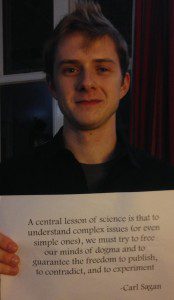 Ian Morse
Ian Morse
I have been involved in journalism since I began studying at Lafayette College, Pennsylvania, USA, and have been engaged in press freedom and reporting in three countries since then. I studied in Turkey last spring, where I interviewed and wrote about journalists and press freedom. It motivated me to begin researching and writing on my own about these topics. Now, as I study for a semester in Cambridge in the UK, I continue to talk about and advocate for free speech and press.
I find it absolutely amazing the power words and information can have in a society. It becomes then extremely damaging to realise that some things cannot be published because they conflict with those in power. Free speech is now becoming a hot topic around the world, particularly among youth, and it makes it all the more important to be able to approach freedom of expression critically and objectively.
A graffiti artist who paints murals in war-torn Yemen, a jailed Bahraini academic and the Ethiopia’s Zone 9 bloggers are among those honoured in this year’s #Index100 list of global free expression heroes.
Selected from public nominations from around the world, the #Index100 highlights champions against censorship and those who fight for free expression against the odds in the fields of arts, journalism, activism and technology and whose work had a marked impact in 2015.
Those on the long list include Chinese human rights lawyer Pu Zhiqiang, Angolan journalist Sedrick de Carvalho, website Raqqa is Being Slaughtered Silently and refugee arts venue Good Chance Calais. The #Index100 includes nominees from 53 countries ranging from Azerbaijan to China to El Salvador and Zambia, and who were selected from around 500 public nominations.
“The individuals and organisations listed in the #Index100 demonstrate courage, creativity and determination in tackling threats to censorship in every corner of globe. They are a testament to the universal value of free expression. Without their efforts in the face of huge obstacles, often under violent harassment, the world would be a darker place,” Index on Censorship CEO Jodie Ginsberg said.
Those in the #Index100 form the long list for the Index on Censorship Freedom of Expression Awards to be presented in April. Now in their 16th year, the awards recognise artists, journalists and campaigners who have had a marked impact in tackling censorship, or in defending free expression, in the past year. Previous winners include Nobel Peace Prize winner Malala Yousafzai, Argentina-born conductor Daniel Barenboim and Syrian cartoonist Ali Ferzat.
A shortlist will be announced in January 2016 and winners then selected by an international panel of judges. This year’s judges include Nobel Prize winning author Wole Soyinka, classical pianist James Rhodes and award-winning journalist María Teresa Ronderos. Other judges include Bahraini human rights activist Nabeel Rajab, tech “queen of startups” Bindi Karia and human rights lawyer Kirsty Brimelow QC.
The winners will be announced on 13 April at a gala ceremony at London’s Unicorn Theatre.
The awards are distinctive in attempting to identify individuals whose work might be little acknowledged outside their own communities. Judges place particular emphasis on the impact that the awards and the Index fellowship can have on winners in enhancing their security, magnifying the impact of their work or increasing their sustainability. Winners become Index on Censorship Freedom of Expression Awards Fellows and are given support for the year after their fellowship on one aspect of their work.
“The award ceremony was aired by all community radios in northern Kenya and reached many people. I am happy because it will give women courage to stand up for their rights,” said 2015’s winner of the Index campaigning award, Amran Abdundi, a women’s rights activist working on the treacherous border between Somalia and Kenya.
Each member of the long list is shown on an interactive map on the Index website where people can find out more about their work. This is the first time Index has published the long list for the awards.
For more information on the #Index100, please contact [email protected] or call 0207 260 2665.